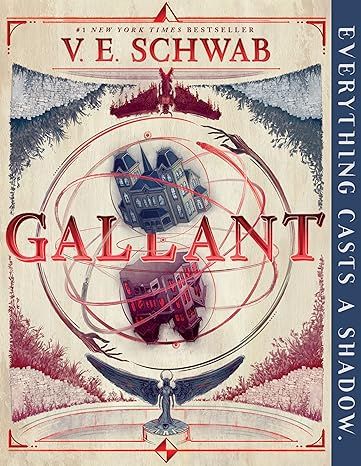Gallant
4.2
-
4,163 ratings
AN INSTANT #1 NEW YORK TIMES BESTSELLER
A KIRKUS BEST BOOK
A USA TODAY BESTSELLER
A NATIONAL INDIE BESTSELLER
“A bone-chilling standalone . . . which fuses Shirley Jackson’s gothic horror sensibilities with the warmth and dark whimsy of Neil Gaiman.”—Publishers Weekly (starred review)
“Gripping worldbuilding, well-rounded characters, and fantastic horror.”—Kirkus Reviews (starred review)
“Unsettling and intriguing.”—Bulletin of the Center for Children's Books (starred review)
Everything casts a shadow. Even the world we live in. And as with every shadow, there is a place where it must touch. A seam, where the shadow meets its source.
#1 New York Times–bestselling author V. E. Schwab weaves a dark and original tale about the place where the world meets its shadow, and the young woman beckoned by both sides. The Secret Garden meets Crimson Peak in this stand-alone novel perfect for readers of Holly Black and Neil Gaiman.
Olivia Prior has grown up in Merilance School for Girls, and all she has of her past is her mother’s journal—which seems to unravel into madness. Then, a letter invites Olivia to come home to Gallant. Yet when Olivia arrives, no one is expecting her. But Olivia is not about to leave the first place that feels like home; it doesn’t matter if her cousin Matthew is hostile, or if she sees half-formed ghouls haunting the hallways.
Olivia knows that Gallant is hiding secrets, and she is determined to uncover them. When she crosses a ruined wall at just the right moment, Olivia finds herself in a place that is Gallant—but not. The manor is crumbling, the ghouls are solid, and a mysterious figure rules over all. Now Olivia sees what has unraveled generations of her family, and where her father may have come from.
Olivia has always wanted to belong somewhere, but will she take her place as a Prior, protecting our world against the Master of the House? Or will she take her place beside him?
New York Times–bestselling author V. E. Schwab crafts a vivid and lush novel that grapples with the demons that are often locked behind closed doors. An eerie, stand-alone saga about life, death, and the young woman beckoned by both. Readers of Neil Gaiman, Holly Black, Melissa Albert, and Garth Nixwill quickly lose themselves in this novel with crossover appeal for all ages.
Read more
Kindle
$0.00
or $10.99 to buy
Audiobook
$0.00
with membership trial
Hardcover
$9.51
Paperback
$9.79
Ships from
Amazon.com
Payment
Secure transaction
ISBN-10
0062835785
ISBN-13
978-0062835789
Print length
352 pages
Language
English
Publisher
Greenwillow Books
Publication date
February 28, 2022
Dimensions
6 x 0.98 x 7.75 inches
Item weight
14.1 ounces
Popular Highlights in this book
When people see tears, they stop listening to your hands or your words or anything else you have to say. And it doesn’t matter if the tears are angry or sad, frightened or frustrated. All they see is a girl crying.
Highlighted by 766 Kindle readers
But what is safe? Tombs are safe. Merilance was safe. Safe does not mean happy, does not mean well, does not mean kind.
Highlighted by 525 Kindle readers
How to exist in a world that does not want you. How to be a ghost in someone else’s home.
Highlighted by 474 Kindle readers
Product details
ASIN :
B09689S4WN
File size :
17809 KB
Text-to-speech :
Enabled
Screen reader :
Supported
Enhanced typesetting :
Enabled
X-Ray :
Enabled
Word wise :
Not Enabled
Editorial Reviews
"A haunting and beautifully tilled garden of darkness, V. E. Schwab's Gallant unearths the shadows—webs of family history, the price of deadly bargains, and the secrets we guard—plunging readers into a triumphant tale that can't be missed." — Dhonielle Clayton, New York Times–bestselling author
“Seeking a place to call home, Olivia uncovers long-buried secrets after arriving at Gallant. . . . Olivia unravels the ominous secrets of both her family and the house, where ghouls lurk around every corner and the dilapidated garden gate calls to her. The evolving relationships between Olivia and her found family shine, and themes of freedom, the self, and belonging are well depicted. . . . The gripping writing and effective incorporation of horror elements, including haunting, inky artwork, are satisfyingly spine-tingling." — Kirkus Reviews (starred review)
“Olivia is elated to receive a letter from her uncle Arthur, inviting her to come live at Gallant, the Priors’ estate. Upon arriving, however, Olivia learns that Arthur is dead, and neither her ill-tempered cousin, Matthew, nor the manor’s kindly caretakers are expecting her. . . . [But] she’s determined to uncover the truth regarding her family’s past in this place. Evocative prose, eerie [black and white] artwork by Šumberac, and superbly rendered characters . . . elevate this affective, bone-chilling standalone from Schwab, which fuses Shirley Jackson’s gothic horror sensibilities with the warmth and dark whimsy of Neil Gaiman.” — Publishers Weekly (starred review)
“Fourteen-year-old Olivia is grateful, if a little shocked, when she receives a letter from a previously unknown uncle inviting her to his manor estate, Gallant. . . . This story strikes just the right balance between menace and melancholy, and the undercurrent of grief running beneath the suspense and horror brings emotional nuance and deep sympathy for each character . . . Schwab’s exquisite prose is rich . . . A surefire hit . . . [for] any reader looking for a dark read on a stormy night.” — Bulletin of the Center for Children’s Books (starred review)
“Schwab uses a blend of Gothic, fantasy, and horror to create an unsettling story that reads like a cautionary folktale to beware the shadows. . . . There is so much grief in this story: over losing family, home, and the way things were. . . . A must-buy for . . . [fans of] Holly Black, Neil Gaiman, Emily Lloyd-Jones, and other authors of creepy and unnerving tales.” — School Library Journal
“When a letter arrives at Merilance inviting Olivia to come to Gallant, a mysterious old home, she may finally have found the family she's always wanted. . . . Schwab nestles this story of heritage and hope into rich, evenly paced prose. Readers of character-driven literary fiction will be mesmerized by this darkly magical tale. . . . [Gallant] will appeal to all her audiences.” — Booklist
“[When] a letter arrives from a hitherto-unknown uncle, welcoming Olivia back home to the family estate . . . she discovers a mirrored world where a Death-like demon reigns, making knights of his shadows and sucking the life out of every living thing. . . . Olivia is a stalwart and sympathetic heroine, whose actions occasionally defy the rules of the house but never those of the heart. Bittersweet, gripping, and with atmosphere to spare, Schwab’s latest gothic tale is exactly the right mix of dark and delightful.” — Horn Book Magazine
Read more
Sample
The master of the house stands at the garden wall.
It is a grim stretch of stone, an iron door locked and bolted at its center. There is a narrow gap between the door and the rock, and when the breeze is right, it carries the scent of summer, sweet as melon, and the distant warmth of sun.
There is no breeze tonight.
No moon, and yet he is bathed in moonlight. It catches the edges of his tattered coat. It shines on the bones where they show through his skin.
He trails his hand along the wall, searching for cracks. Stubborn strands of ivy follow in his wake, questing like fingers into every fissure, and nearby a bit of stone breaks free and tumbles to the ground, exposing a narrow slice of someone else’s night. The culprit, a field mouse, scrambles through, and then down the wall, over the master’s boot. He catches it in one hand, with all the grace of a snake.
He bends his head to the crack. Fastens his milk-white eyes on the other side. The other garden. The other house.
In his hand, the mouse squirms, and the master squeezes.
“Hush,” he says, in a voice like empty rooms. He is listening to the other side, to the soft chirp of birdsong, the wind through lush leaves, the distant pleading of someone in their sleep.
The master smiles and picks up the bit of broken rock and nestles it back into the wall, where it waits, like a secret.
The mouse has stopped squirming in the cage of his grip.
When he opens his hand, there is nothing left but a streak of ash and rot and a few white teeth, little bigger than seeds.
He tips them out onto the wasted soil and wonders what will grow.
Part One
The School
Chapter One
Rain drums its fingers on the garden shed.
They call it a garden shed, but in truth there is no garden on the grounds of Merilance, and the shed is barely even that. It sags to one side, like a wilting plant, made of cheap metal and moldering wood. The floor is littered with abandoned tools and shards of broken pots and the stubs of stolen cigarettes, and Olivia Prior stands among them in the rusted dark, wishing she could scream.
Wishing she could turn the pain of the fresh red welt on her hand into noise, overturn the shed the way she did the pot in the kitchen when it burned her, strike the walls as she longed to strike Clara for leaving the stove on and having the nerve to snicker when Olivia gasped and let go. The white-hot pain, the red-hot anger, the cook’s annoyance at the ruined mash, and Clara’s pursed lips as she said, “It couldn’t have hurt that much, she didn’t make a sound.”
Olivia would have wrapped her hands around the other girl’s throat right there if her palm weren’t singing, if the cook weren’t there to haul her off, if the gesture would have gained her more than a moment’s pleasure and a week’s punishment. So she’d done the next best thing: stormed out of the stuffy tomb, the cook bellowing in her wake.
And now she’s in the garden shed, wishing she could make as much noise as the rain on the low tin roof, take up one of the neglected spades and beat it against the thin metal walls, just to hear them ring. But someone else would hear, would come and find her, in this small and stolen place, and then she’d have nowhere to get away. Away from the girls. Away from the matrons. Away from the school.
She holds her breath and presses her burned hand against the cool metal shed, waiting for the ache in her skin to quiet.
The shed itself is not a secret.
It sits behind the school, across the gravel drive, at the back of the grounds. Over the years, a handful of girls have tried to claim it as their own, to smoke or drink or kiss, but they come once and never come back. It gives them the creeps, they say. Damp soil and spiderwebs, and something else, an eerie feeling that makes the hair stand up on their necks, though they don’t know why.
But Olivia knows.
It is the dead thing in the corner.
Or what’s left of it. Not a ghost, exactly, just a bit of tattered cloth, a handful of teeth, and a single, sleepy eye floating in the dark. It moves like a silverfish at the edge of Olivia’s sight, darting away every time she looks. But if she stays very still and keeps her gaze ahead, it might grow a cheekbone, a throat. It might drift closer, might blink and smile and sigh against her, weightless as a shadow.
She has wondered, of course, who it was, back when it had bones and skin. The eye hovers, higher than her own, and once she caught the edge of a bonnet, the fraying hem of a skirt, and thought, perhaps, it was a matron. Not that it matters. Now, it is only a ghoul, lurking at her back.
Go away, she thinks, and perhaps it can hear her thoughts, because it flinches and draws back into the dark again, leaving her alone in the grim little shed.
Olivia leans back against the wall.
When she was younger, she liked to pretend that this was her house, not Merilance. That her mother and father had just stepped out and left her to clean up. They would be coming back, of course.
Once the house was ready.
Back then, she’d sweep away the dust and cobwebs, stack the pot shards and make order of the shelves. But no matter how tidy she tried to make the little shed, it was never clean enough to bring them back.
Home is a choice. Those four words sit alone on a page in her mother’s book, surrounded by so much white space they feel like a riddle. In truth, everything her mother wrote feels like a riddle, waiting to be solved.
By now, the rain has slowed from pounding fists to the soft, infrequent tapping of bored fingers, and Olivia sighs and abandons the shed.
Outside, everything is gray.
The gray day is beginning to melt into a gray night, thin gray light lapping against the gray gravel path that surrounds the gray stone walls of Merilance School for Independent Girls.
The word “school” conjures images of neat wooden desks and scratching pencils. Of learning. They do learn, but it is a perfunctory education, spent on the practical. How to clean a fireplace. How to shape a loaf of bread. How to mend someone else’s clothes. How to exist in a world that does not want you. How to be a ghost in someone else’s home.
Merilance may call itself a school, but in truth, it is an asylum for the young and the feral and the fortuneless. The orphaned and unwanted. The dull gray building juts up like a tombstone, surrounded not by parks or rolling greens but the gaunt and sagging faces of the other structures at the city’s edge, chimneys wheezing smoke. There are no walls around the place, no iron gates, only a vacant arch, as if to say, You’re free to leave, if you have somewhere else to go. But if you go—and now and then, girls do—you will not be welcomed back. Once a year, sometimes more, a girl pounds at the door, desperate to get back in, and that is how the others learn that it’s well and good to dream of happy lives and welcome homes, but even a grim tombstone of a place is better than the street.
And yet, some days Olivia is still tempted.
Some days, she eyes the arch, yawning like a mouth at the gravel’s edge, and thinks, what if, thinks, I could, thinks, one day I will.
One night, she will break into the matrons’ rooms and take whatever she can find and be gone. She will become a vagabond, a train robber, a cat burglar, or a con artist, like the men in the penny dreadfuls Charlotte always seems to have, tokens from a boy she meets at the edge of the gravel moat each week. Olivia plans a hundred different futures, but every night, she is still there, climbing into the narrow bed in the crowded room in the house that is not, and will never be, a home. And every morning she wakes up in the same place.
Olivia shuffles back across the yard, her shoes sliding over the gravel, with a steady shh, shh, shh. She keeps her eyes on the ground, searching for color. Now and then, after a good hard rain, a few green blades will force their way up between the pebbles, or a stubborn sheen of moss will latch onto a cobblestone, but these defiant colors never last. The only flowers she sees are in the head matron’s office, and even those are fake and faded, silk petals long gone gray with dust.
And yet, as she rounds the school, heading for the side door she left ajar, Olivia sees a dash of yellow. A little weedy bloom, jutting up between the stones. She kneels, ignoring the way the pebbles bite into her knees, and brushes a careful thumb over the tiny flower. She’s just about to pluck it when she hears the stomp of shoes on gravel, the familiar rustle and sigh of skirts that signal a matron.
They look the same, the matrons, in their once-white dresses with their once-white belts. But they’re not. There’s Matron Jessamine, with her tight little smile, as if she’s sucking on a lemon, and Matron Beth, with her deep-set eyes and the bags beneath, and Matron Lara, with a voice as high and whining as a kettle.
And then, there’s Matron Agatha.
“Olivia Prior!” she booms, in a breathless huff. “What are you doing?”
Olivia lifts her hands, even though she knows it’s futile. Matron Sarah taught her how to sign, which was well and good until Matron Sarah left and none of the others bothered to learn.
Now it doesn’t matter what Olivia says. No one knows how to listen.
Agatha stares at her as she shapes planning my escape, but she’s only halfway through when the matron flaps her own hands, impatient.
“Where—is—your—chalkboard?” she asks, speaking loud and slow, as if Olivia is hard of hearing. She is not. As for the chalkboard, it’s wedged behind a row of jam jars in the cellar, where it has been since it was first bestowed upon her, complete with a little rope to go around her neck.
“Well?” demands the matron.
Olivia shakes her head and picks the simplest sign for rain, repeating the gesture several times so the matron has a chance to see, but Agatha just tsks and grabs her wrist and hauls her back inside.
“You were supposed to be in the kitchen,” says the matron, marching Olivia down the hall. “Now it’s time for dinner, which you have not helped to make.” And yet, by some miracle, thinks Olivia, judging by the scent wafting toward them, it is ready.
They reach the dining room, where girls’ voices pile high, but the matron pushes her on, past the doors.
“Those who do not give, do not partake,” she says, as if this is a Merilance motto and not something she’s just thought up. She gives a curt little nod, pleased with herself, and Olivia pictures her stitching the words onto a pillow.
They reach the dormitory, where there are two dozen small shelves beside two dozen beds, thin and white as matchsticks, all of them empty.
“To bed,” says the matron, though it isn’t even dark. “Perhaps,” she adds, “you can use this time to reflect on what it means to be a Merilance girl.”
Olivia would rather eat glass, but she just nods and does her best to look contrite. She even curtsies once, bobbing her head low, but it is only so the matron cannot see the twist of her lips, the small, defiant smile. Let the old bat assume that she is sorry.
People assume a lot of things about Olivia.
Most of them are wrong.
The matron shuffles away, clearly not wanting to miss dinner, and Olivia steps into the dorm. She lingers at the foot of the first bed, listening to the rustle of receding skirts. As soon as Agatha has gone, she emerges again, slipping down the hall and around the corner to the matrons’ quarters.
Each of the matrons has her own room. The doors are locked, but the locks are old and simple, the teeth on the keys little more than simple peaks.
Olivia draws a bit of sturdy wire from her pocket, remembering the shape of Agatha’s key, the teeth a capital E. It takes a bit of fussing, but then the lock clicks, and the door swings open onto a neat little bedroom cluttered with pillows, little mantras embroidered across their fronts.
Here by the grace of God.
A place for all things, and all things in their place.
A house in order is a mind at peace.
Olivia’s fingers trail over the words as she rounds the bed. A little mirror sits on the windowsill, and as she passes, she catches a glimpse of charcoal hair and a sallow cheek, and startles. But it is just her own reflection. Pale. Colorless. The ghost of Merilance. That’s what the other girls call her. Yet there is a satisfying hitch in their voices, a hint of fear. Olivia looks at herself in the mirror. And smiles.
She kneels before the ash wood cabinet beside Agatha’s bed. The matrons have their vices. Lara has cigarettes, and Jessamine has lemon drops, and Beth has penny dreadfuls. And Agatha? Well. She has several. A bottle of brandy sloshes in the top drawer, and beneath that, Olivia finds a tin of cookies, iced with sugar, and a paper bag of clementines, bright as tiny sunsets. She takes three of the iced cookies and one piece of fruit, and retreats, silently, to the empty dorm to enjoy her dinner.
Read more
About the authors
V. E. Schwab
VICTORIA “V. E.” SCHWAB is the #1 New York Times bestselling author of more than twenty books, including the acclaimed Shades of Magic series, the Villains series, the Cassidy Blake series and the international bestseller The Invisible Life of Addie LaRue. Her work has received critical acclaim, translated into over two dozen languages, and optioned for television and film. First Kill – a YA vampire series based on Schwab’s short story of the same name – is currently in the works at Netflix with Emma Roberts’ Belletrist Productions producing. When she's not haunting Paris streets or trudging up English hillsides, she lives in Edinburgh, Scotland, and is usually tucked in the corner of a coffee shop, dreaming up monsters.
Read more
Reviews
Customer reviews
4.2 out of 5
4,163 global ratings
Joshua
5
Fantastic one off book
Reviewed in the United States on April 19, 2024
Verified Purchase
I had never read a book by this author, but I was pleasantly surprised by the writing style. It was a great read, and I am now moving into some of his other works.
2 people found this helpful
Michelle M.
5
Like reading a beautiful classic gothic novel
Reviewed in the United States on October 12, 2022
Verified Purchase
First of all, this book was excellent. It was beautifully written. The story feels like a classic gothic novel with an orphan, ghosts, a haunted mansion, mysterious journals, plenty of time spent in old libraries and music rooms, a melancholy garden and a creepy garden wall. But all these things are written so beautifully and vividly that I really found myself absorbed into the story, and afraid to look under my bed. The creepy aspect was perfect. Just enough to make for a great gothic story without being TOO scary that you can’t sleep (unless you can’t sleep because you’re staying up reading this!)
Second. It absolutely drives me crazy when people complain that an author is “just writing this for the money”. What an absolutely idiotic take. I HOPE authors are writing for money! Making money means they get to keep writing books. And especially when a writer as diverse as V.E. Schwab tries something a little diffident for them. I love to see those things succeed so they can keep trying new things.
I hate it when people read one book they love and then complain that every other book isn’t that book. (ever notice how this is mostly done to women and minority authors?)
VE Schwab writes a lot of different styles and kinds of books. But their writing is so vivid and beautiful and their story telling is so captivating. That’s what makes them such a fun author to read.
Anyway. This book is really good and a perfect October, creepy season, read. It is a younger YA to upper Middle Grade novel so it’s not as complex as some of their other, more adult, books.
The physical book is gorgeous with beautiful illustrations that really help the story come to life. I also listened to the audio book, Narrated by Julian Rhind-Tutt, which really well done. I am happy I own both.
I definitely recommend this book, especially if you’re in the mood for a gothic book or as an introduction to gothic style literature.
Read more
22 people found this helpful
Joshua P Camara
5
Fantastic Book
Reviewed in the United States on July 13, 2024
Verified Purchase
Absolutely fantastic book. V.E. Schwab is an excellent storyteller. I’ve really enjoyed each of her books. This is definitely equal to what she’s written before. I highly recommend.
Rod Schwarm
5
great item, it was a gift
Reviewed in the United States on May 26, 2024
Verified Purchase
great item, it was a gift
Spring Norris
5
So amazing.
Reviewed in the United States on July 7, 2024
Verified Purchase
I devoured this story. It's so beautifully written and I will end up buying a hard copy so I can reread it.
Top V. E. Schwab titles
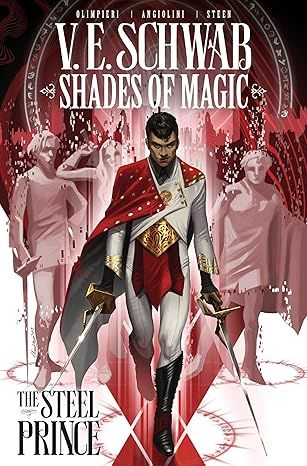
Shades Of Magic: The Steel Prince Vol. 1 (Graphic Novel)
4.1
-
468
$16.99
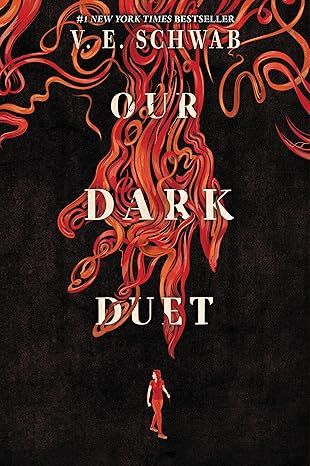
Our Dark Duet (Monsters of Verity, 2)
4.5
-
1,676
$10.43
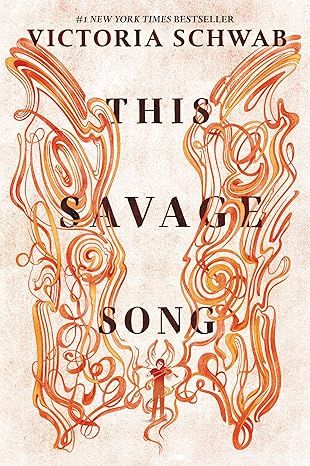
This Savage Song (Monsters of Verity, 1)
4.3
-
4,179
$2.08
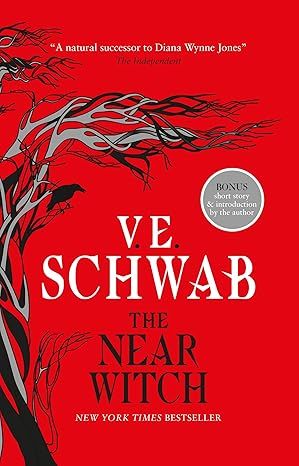
The Near Witch
4.3
-
2,183
$11.69
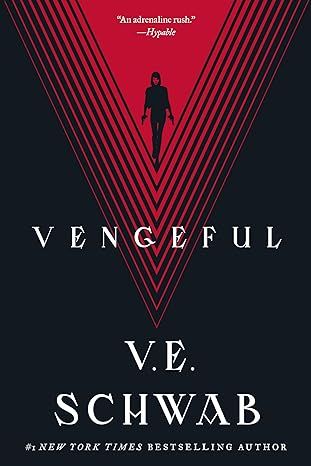
Vengeful (Villains, 2)
4.4
-
5,141
$9.73
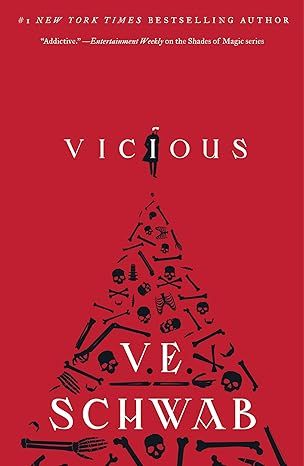
Vicious (Villains, 1)
4.3
-
15,391
$10.99
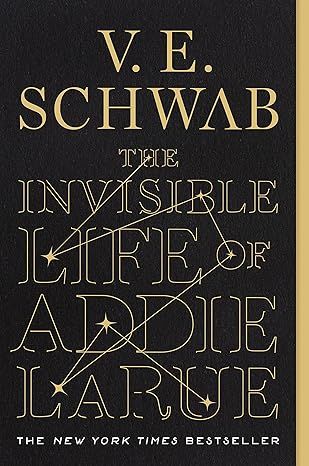
The Invisible Life of Addie LaRue
4.5
-
88,565
$12.59
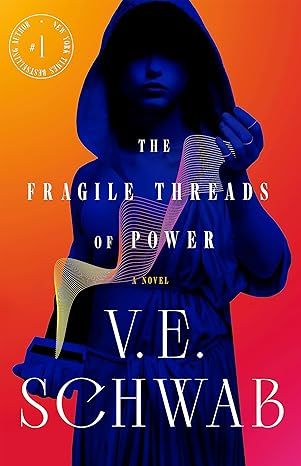
The Fragile Threads of Power (Threads of Power, 1)
4.6
-
2,325
$9.00
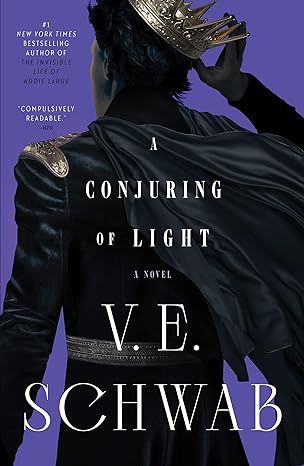
A Conjuring of Light: A Novel (Shades of Magic, 3)
4.5
-
10,508
$12.07
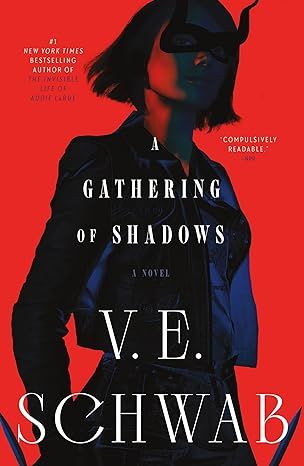
A Gathering of Shadows: A Novel (Shades of Magic, 2)
4.5
-
13,065
$12.31
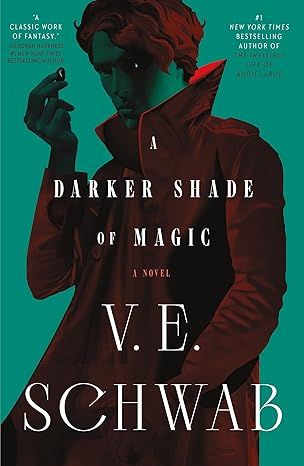
A Darker Shade of Magic: A Novel (Shades of Magic, 1)
4.3
-
21,064
$15.77
Best Sellers

The Tuscan Child
4.2
-
100,022
$8.39

The Thursday Murder Club: A Novel (A Thursday Murder Club Mystery)
4.3
-
155,575
$6.33

Sapiens: A Brief History of Humankind
4.6
-
140,302
$13.49

The Butterfly Garden (The Collector, 1)
4.3
-
88,556
$9.59

Things We Hide from the Light (Knockemout Series, 2)
4.4
-
94,890
$11.66

The Last Thing He Told Me: A Novel
4.3
-
154,085
$2.99

The Perfect Marriage: A Completely Gripping Psychological Suspense
4.3
-
143,196
$9.47

The Coworker
4.1
-
80,003
$13.48

First Lie Wins: A Novel (Random House Large Print)
4.3
-
54,062
$14.99

Mile High (Windy City Series Book 1)
4.4
-
59,745
$16.19

Layla
4.2
-
107,613
$8.99

The Locked Door
4.4
-
94,673
$8.53
